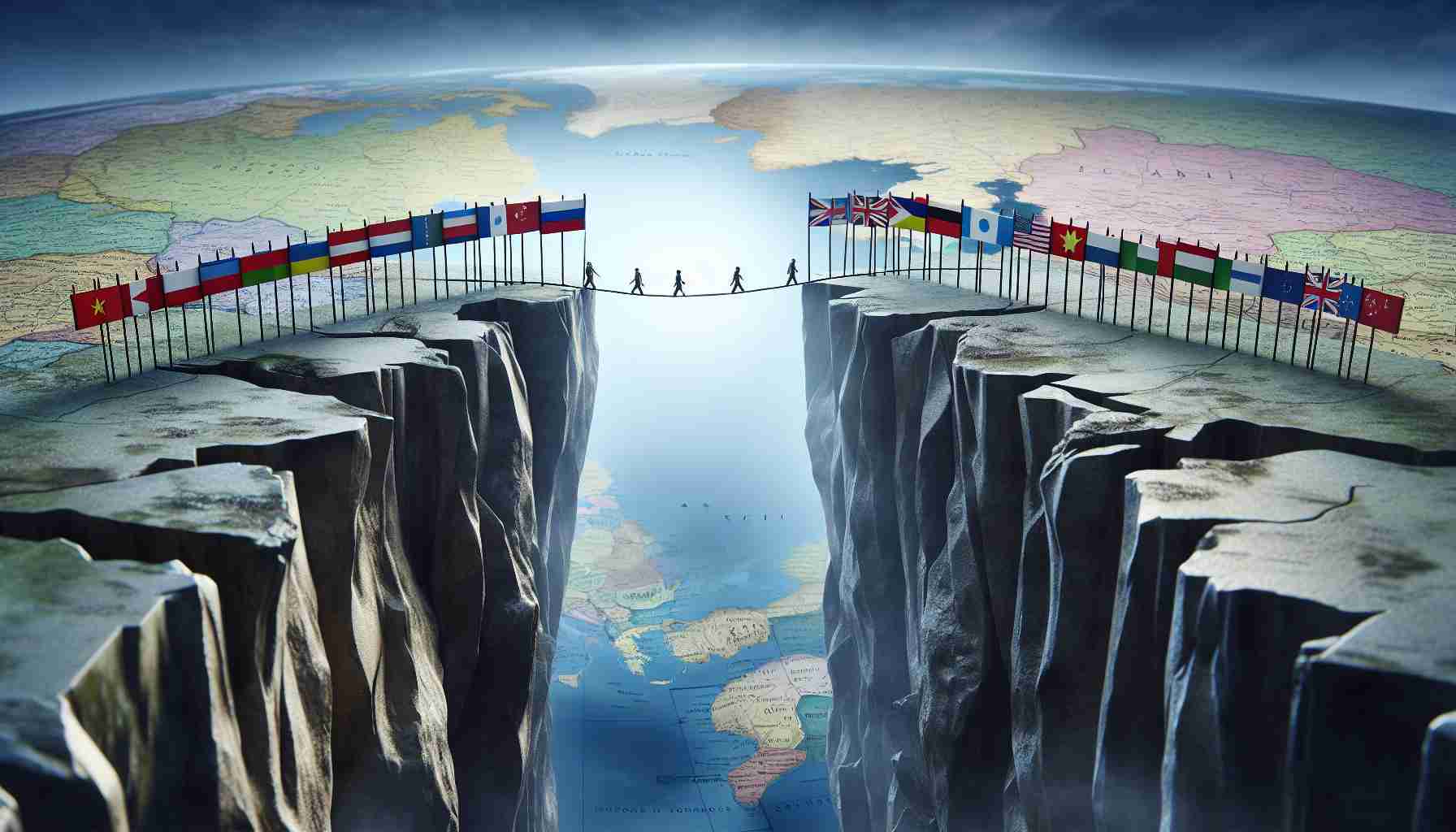- Global leaders face a complex diplomatic challenge as tensions rise in Ukraine, prompting strategic discussions at the Élysée.
- President Zelensky’s Middle Eastern tour highlights his marginal role in talks shaping Ukraine’s fate as U.S.-Russia discussions dominate the agenda in Riyadh.
- European unity becomes a focal point, with Ursula von der Leyen and Poland’s Donald Tusk advocating for enhanced defense strategies without direct military involvement in Ukraine.
- The UK signals potential peacekeeping roles, contrasting Germany’s cautious stance.
- The Kremlin denounces European plans, hinting at a closer Trump-Putin relationship amid accusations of conflict escalation.
- Europe faces challenges of internal division and exclusion from critical negotiations, affecting its global diplomatic influence.
An electric pulse reverberates through the corridors of power as global leaders grapple with the delicate situation in Ukraine. Fresh off a phone call with Donald Trump, Emmanuel Macron convenes an urgent summit in the gilded halls of the Élysée. The mission: devise a coherent strategy to bolster Europe’s collective security amidst simmering unrest.
Amidst this diplomatic fervor, Ukrainian President Volodymyr Zelensky embarks on a whirlwind tour of the Middle East, making stops in the United Arab Emirates and Turkey, before a crucial visit to Riyadh beckons. Riyadh’s own agenda is dominated by critical U.S.-Russia talks, casting a spotlight on the hushed whispers of potential Russian-American reconciliation. However, Zelensky finds himself sidelined, peering from the periphery as decisions about his nation’s future unfold without him.
As discussions heat up, Ursula von der Leyen, the formidable President of the European Commission, underscores the urgent need for Europe to awaken from its slumber, enhancing defense mechanisms and unifying in purpose. Meanwhile, Poland’s Prime Minister Donald Tusk echoes this sentiment, advocating for strengthened defense capabilities without sending troops into Ukraine’s turbulent terrain, a step considered premature by Germany while the United Kingdom signals a readiness to intervene if peacekeeping becomes imperative.
Yet, the grand chessboard of global diplomacy is fraught with division. The Kremlin vociferously opposes any European involvement, accusing the bloc of perpetuating conflict, while hinting at burgeoning ties between Trump and Putin. As Europe seeks a role in shaping the path to peace, it faces the dual challenge of internal discord and external exclusion. The stakes are high, and the world watches, waiting to see if unity will prevail or fracture under the weight of geopolitical strain.
The Geopolitical Chess Game: Understanding Europe’s Security Strategy Amidst the Ukraine Crisis
Europe’s Security Strategy and How Global Leaders Are Responding
The simmering tension in Ukraine has catalyzed urgent deliberations among global leaders. As this geopolitical chess match unfolds, Europe’s security strategy becomes a focal point for ensuring stability and peace. However, questions remain about how Europe can strengthen its defense mechanisms while contending with internal and external pressures.
How-To Steps & Life Hacks
1. Understanding Diplomatic Channels: To comprehend ongoing diplomatic efforts, follow news outlets that offer comprehensive coverage of international relations, such as BBC or Politico EU. These sources often provide real-time updates and expert analysis.
2. Involvement in Discussions: Participate in forums and webinars hosted by think tanks like Chatham House or the Council on Foreign Relations to gain deeper insights into diplomatic strategies being proposed and their implications.
3. Analyzing Defense Policies: Engage with policy papers from organizations such as the European Council on Foreign Relations to understand the proposed defense enhancements by European leaders.
Real-World Use Cases
– Economic and Military Dependencies: Europe’s reliance on Russian energy supplies highlights the need for diversifying energy sources to enhance security. Countries like Lithuania are investing in alternative energy through LNG terminals.
– NATO’s Role: NATO’s increased presence in Eastern Europe exemplifies a defensive posturing approach, reinforcing the importance of military alliances in regional stability.
Market Forecasts & Industry Trends
The defense and cybersecurity markets in Europe are expected to see significant growth. According to a report by MarketsandMarkets, the European cybersecurity market alone is projected to reach over $65 billion by 2025, driven by increasing threats and the need for robust digital protection frameworks.
Reviews & Comparisons
Countries’ Responses:
– France: Focuses on diplomatic channels and defense collaboration within the EU.
– Germany: Advocates for cautious engagement, maintaining its strong economic ties with Russia.
– United Kingdom: Signals preparedness for direct intervention, reinforcing a more aggressive stance.
Controversies & Limitations
– Division Within the EU: Different member states have contrasting levels of willingness to engage militarily, highlighting a lack of cohesive strategy.
– Russia’s Opposition: The Kremlin opposes European involvement, viewing it as an unwelcome interference that could exacerbate tensions.
Security & Sustainability
Europe’s energy independence is crucial for security. The ongoing discussions highlight the need to advance renewable energy projects, reducing reliance on Russian resources, thereby enhancing long-term sustainability.
Insights & Predictions
The geopolitical landscape is likely to remain volatile, with Europe’s ability to unify under a common defense strategy being pivotal. Analysts predict that internal EU cohesion will be a decisive factor in the bloc’s ability to exert influence globally.
Pros & Cons Overview
– Pros: Enhanced defense posture could deter aggression, provide stability, and promote peace.
– Cons: Possible heightened tensions with Russia, increased military expenditure, and potentially limited consensus within the EU.
Actionable Recommendations
1. Keep informed: Regularly read updates from credible sources and participate in discussions to understand the broader implications of diplomatic developments.
2. Support energy diversification: Advocate for policies that promote renewable energy and reduce dependency on external suppliers, contributing to both energy security and environmental sustainability.
3. Engage with local policymakers: Encourage your representatives to prioritize defense and cybersecurity enhancements, ensuring robust preparedness mechanisms.
By staying informed and active in discussions, readers can align with Europe’s evolving strategies amidst the geopolitical strains surrounding Ukraine. For more insightful analysis, visit Council on Foreign Relations and explore their comprehensive content on international relations.
